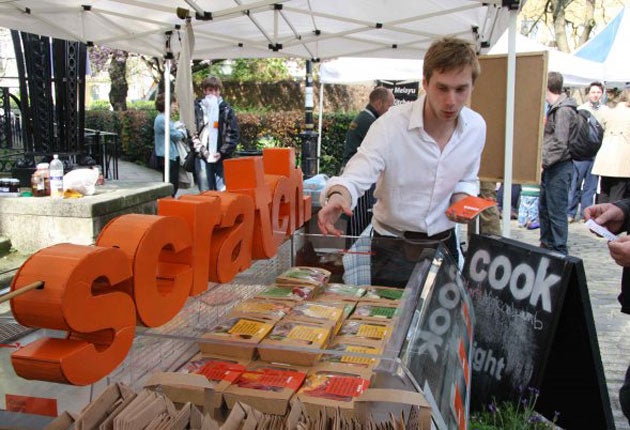Make your idea and start selling it: the best way to develop products
In a market where over 90 per cent of new products fail at launch, getting out there is the only way to truly understand your market, says Alex Neves

Your support helps us to tell the story
From reproductive rights to climate change to Big Tech, The Independent is on the ground when the story is developing. Whether it's investigating the financials of Elon Musk's pro-Trump PAC or producing our latest documentary, 'The A Word', which shines a light on the American women fighting for reproductive rights, we know how important it is to parse out the facts from the messaging.
At such a critical moment in US history, we need reporters on the ground. Your donation allows us to keep sending journalists to speak to both sides of the story.
The Independent is trusted by Americans across the entire political spectrum. And unlike many other quality news outlets, we choose not to lock Americans out of our reporting and analysis with paywalls. We believe quality journalism should be available to everyone, paid for by those who can afford it.
Your support makes all the difference.At 3.45am on a rainy morning in May two years ago, I woke to a chorus of alarm clocks, and headed down to New Covent Garden Market to meet Phil, my school friend and business partner, who was in the midst of haggling, albeit rather unsuccessfully, with a stall holder. This was it. After months of painstaking research and planning, our task was simple: cast aside the books and theory, make up our products and get them into the kitchens of paying customers.
Though neither of us had any previous business experience, we had followed the advice of countless start-up guides and new business seminars; we’d written a business plan, identified market trends, developed a product, organised focus groups to try early prototypes, set up an online questionnaire and even pestered commuters in train stations to find out what they thought of the concept.
Whilst this sort of research was invaluable, we were faced with a slight problem. On the basis of our research, we’d have 95 per cent of adults, across all socio-economic groups, buying our products at a cost of £6 per go, at least four nights a week - for all eternity. That, of course, excludes the extras they would buy for their close friends and family, so taken they were with the idea.
This gave us confidence that our idea was a good one, however it also highlighted that maybe we’d missed something, that there were clearly some fundamental questions that hadn’t been answered and couldn’t be tested in this way: was our product right? Would people actually buy it when there was money involved?
This realisation, that the proof of the pudding is in the eating, led us to the 3:45am wake up calls and a real drive to test our products on the paying public. We rented a stall at Whitecross Street Market, bought a second-hand chiller, decorated our stall and made the tentative leap from business plan to business. We made 100 meals on our first day of trading, and despite a few nail biting initial hours after the market opened, our rather direct promotional activity (literally grabbing customers off the street) finally paid off and to our great delight, we sold out by the end of the day.
Above and beyond the sales, the insights from our first day were so great that we kept our stall at Whitecross Street Market for three months, and looking back, would not recommend any other approach as more beneficial to businesses launching products for the first time.
The market offered us a low-cost and flexible platform from which to start building up a record of sales. These proved essential in developing future sales, raising finance and in building up relationships with suppliers. It’s amazing how much more seriously people take you when you can refer to a product that is actually selling, even if only in small quantities, rather than one that is only hypothetical.
The most valuable aspect of our experience in the market was that it allowed us to communicate with our customers on a daily basis and respond to their feedback on our products, marketing and pricing in real time. Over the three months we were able to take many small-scale risks and experiment with many different recipes, points of sale, kinds of messaging, and price points, allowing us to develop those that worked and tweak those that proved unpopular.
So, our two pennies' worth is this: market research is great for providing a foundation, however what people say and what people do is rarely the same. According to the last survey I completed, I visit the gym five times a week, my favourite book is War and Peace and I've never eaten a Macdonalds.
Get out there and flog your product, there’s no other way of knowing if it’ll work.
Alex Neves is director of ready-to-cook meals company Scratch
Join our commenting forum
Join thought-provoking conversations, follow other Independent readers and see their replies
Comments